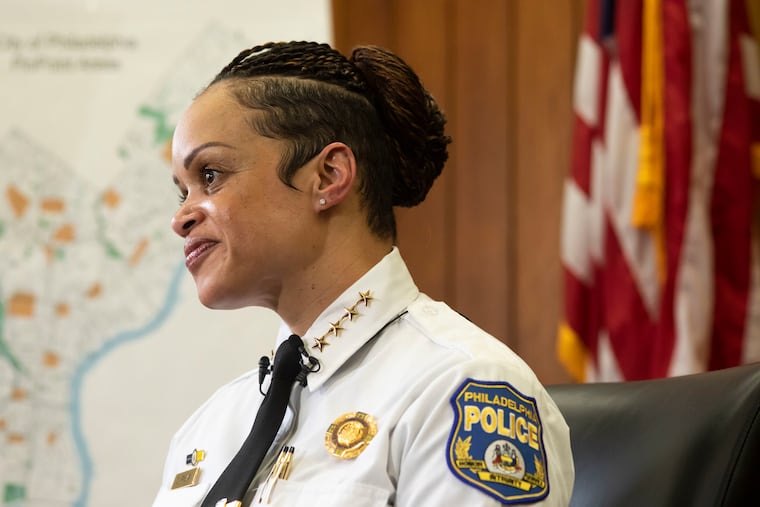New Philly Police Commissioner Danielle Outlaw is already making changes — starting with her fingernails
Danielle Outlaw made clear she had distinct views on her profession, and one of her first changes — allowing police officers to wear colored nail polish — reflected what she believes is a broader and necessary cultural shift.

Danielle Outlaw, who took over Monday as Philadelphia’s new police commissioner, said the nail polish she wore this week had been among the last things on her mind on her first day on the job.
But while making the rounds and introducing herself to the troops, Outlaw said, people kept pointing out that her black nail polish technically violated the department’s directives on appearance.
So in one of her first official actions as top cop, Outlaw changed the rule to allow for more stylish nails. And during an interview Wednesday, one of her first since taking over, Outlaw — the first black woman to lead the 6,500-member department — said that although the action might have seemed narrow, it reflects the type of broader change she believes is needed in policing.
“It’s the small things that allow us to feel not only welcome but supported,” she said. “It’s one thing to recruit me and say, ‘Oh yes, we want you.’ But if there’s no support system in place to say, ‘Not only do [we] want you, but we celebrate you and we recognize that you bring [something] different,’ ... we’re not going to get the people that we say that we want.”
It has been a whirlwind few days for Outlaw, 43, an Oakland native who served on that city’s force for two decades before spending the last two years as the chief of police in Portland, Ore.
Friends and colleagues in her hometown have described her as unapologetic and unconventional, and during Wednesday’s 25-minute interview, Outlaw made clear she had distinct views on her profession.
She said minority communities have deeply rooted mistrust of police because the profession was conceived as slave patrols — groups who sought to control the behavior and movements of slaves — and added that “in some places, [police departments] might further that institutionalized and systemic racism that many people have experienced.”
But she also said most cops today “have nothing to do with” the actions of the past, and said they sign up for the job out of a genuine desire to serve.
“The only way, I think, to get beyond [the mistrust] is to allow community to see us,” she said, adding that it required building trust in neighborhoods and “not solely based around enforcement.”
Still, Outlaw was hesitant to specify her plans or timeline for building an inner circle, and declined to offer details on potential new methods for combating the city’s ongoing gun violence.
She said she has been digesting a host of materials she requested before she arrived, including biographies of current department leaders, crime statistics for the last three years, and reports on the department’s technology infrastructure.
Outlaw is aware that she has much on her plate.
“It takes a lot to turn a ship, and turn the tide,” she said, “but it certainly can be done.”
Command changes?
Outlaw has three deputy commissioners: Dennis Wilson, Robin Wimberly, and Christine M. Coulter, who served as acting commissioner for six months after former top cop Richard Ross resigned in August.
Coulter oversaw a host of promotions and transfers in December. Outlaw said that in deciding who she feels might deserve a new assignment — or who would be in her inner circle — she would lean on her experiences observing people, hearing them talk, and watching them in action.
“It’s actually easier than a lot of people think: You can tell who the innovators are,” she said. “You can tell those who are OK with status quo and need a little nudging. You can tell. People self-identify rather quickly.”
One person who will not be part of her command staff is Joseph P. Sullivan, a 37-year veteran and former deputy commissioner who resigned last month. Sources said he had been told he would be moved to a lower rank.
» READ MORE: Philadelphia Deputy Police Commissioner Joe Sullivan resigns
Outlaw declined to say Wednesday if she was the one who made that call, saying only: “I was aware that he was going to retire."
Violence plans
Philadelphia has recorded 44 homicides through Tuesday, the highest year-to-date total since 2012, according to police statistics.
Outlaw said she wanted to bring fresh eyes and “a level of urgency” to the task, but added that she was still getting up to speed on the department’s current strategies for gun violence: “It’s Day Three,” she said when pressed for specifics.
Still, she alluded to the city’s plans to roll out a strategy known as group violence intervention this spring, in which law enforcement seeks to use resources on a small population of potential offenders. Oakland used a similar strategy in recent years and saw a 50% reduction in gun violence.
And Outlaw said she has been reviewing the rest of the department’s current tactics to determine how they might be tweaked.
“I am very confident that in some period of time, in a very short period of time, I will have conducted an assessment of some kind, so we can roll something out,” she said.
Success
As for what she would view as success during her tenure, Outlaw declined to identify a specific metric, saying it would involve intangible factors.
She said she wants police officers to be confident that the community trusts the department. She wants employees to feel valued internally. And she wants people to believe that, whatever change she might implement, “I did things for the right reasons.”
“[I want] people [to] walk away saying, ‘You know what, she might have come in here and done a few things,’ ” Outlaw said, “ ‘but at least she was fair.’ ”